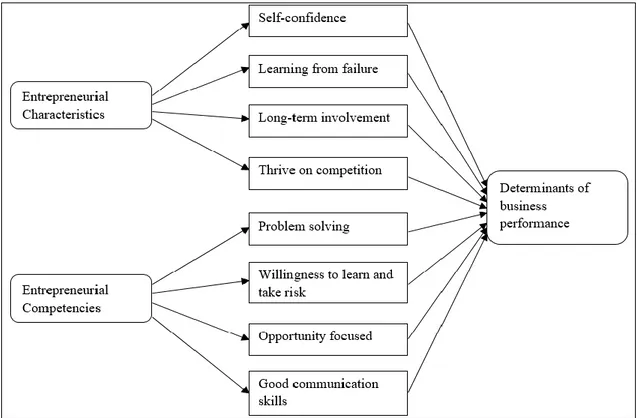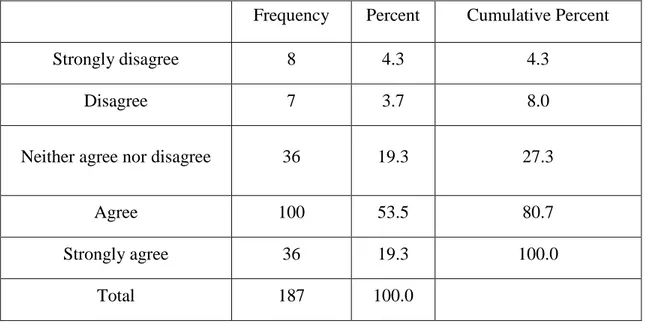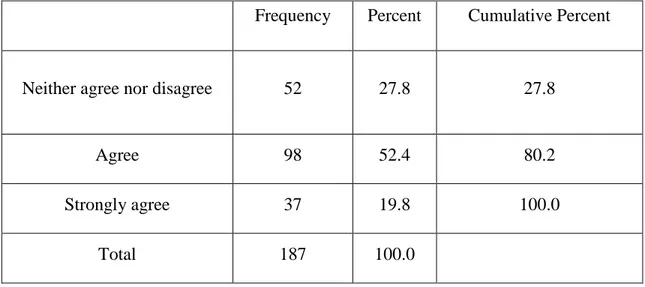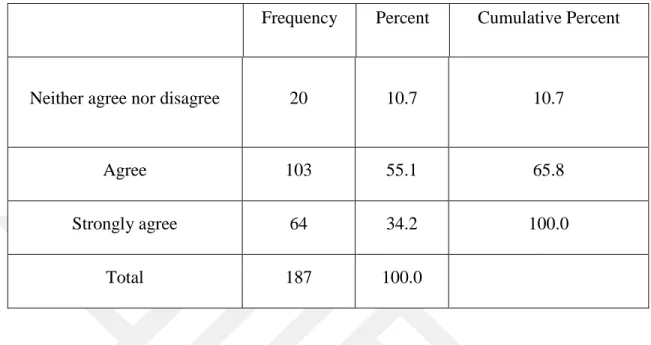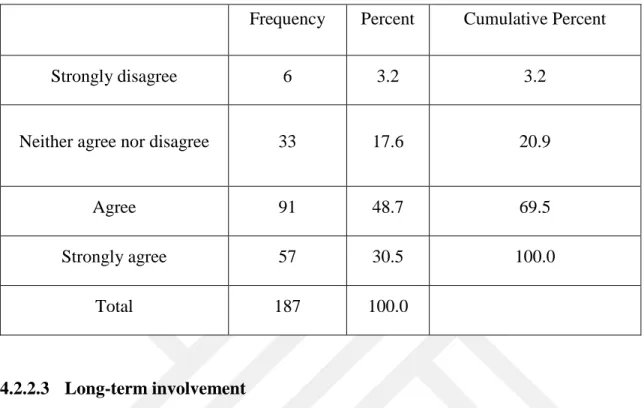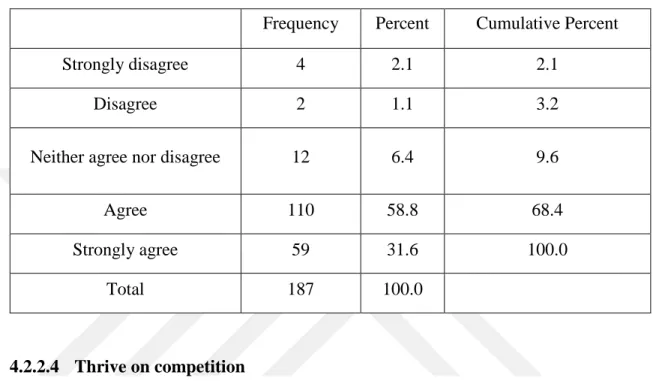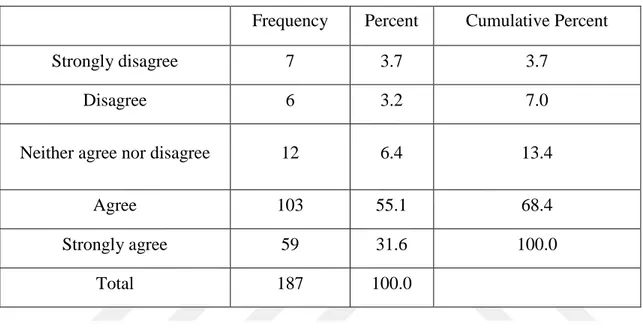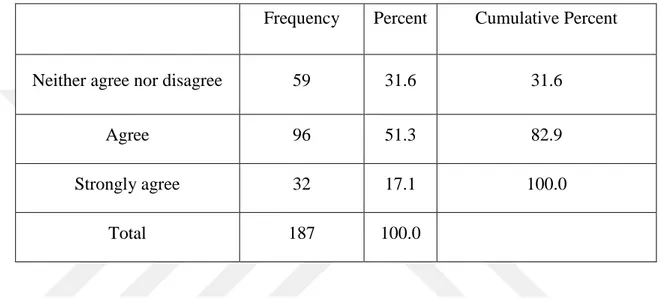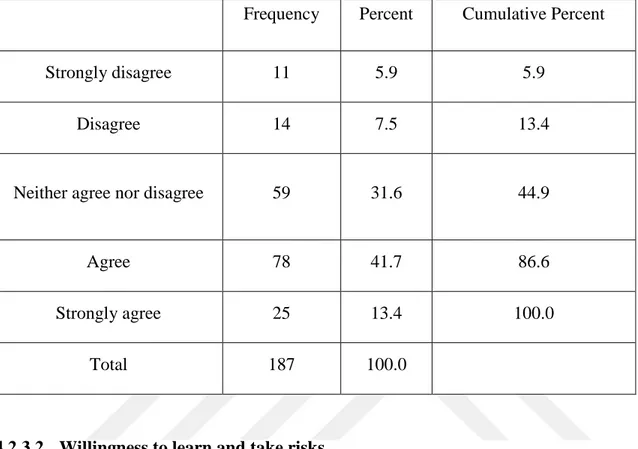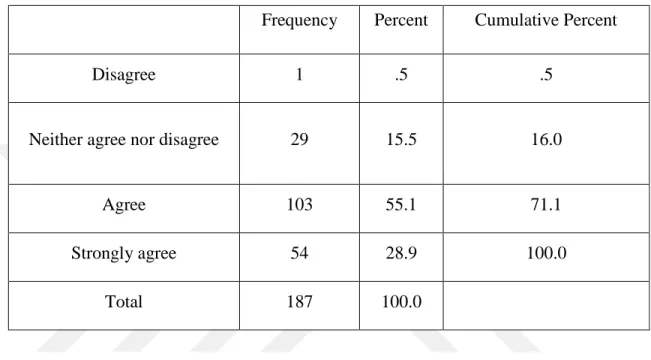T.C.
ISTANBUL AYDIN UNIVERSITY INSTITUTE OF SOCIAL SCIENCES
ENTREPRENEURIAL CHARACTERISTICS AND COMPETENCIES AS DETERMINANTS OF BUSINESS PERFORMANCE: A STUDY ON SMALL
ENTERPRISES IN MOGADISHU, SOMALIA
M.Sc. THESIS
ABDULLAHI ISSE MAHADALLE (Y1412.130032)
Department of Business Business Management Program
Thesis Advisor: Asst. Prof. Dr. BURÇİN KAPLAN
v FOREWORD
This effort, this thesis is becoming a reality with plentiful help from several individuals and entities. I am here to extend my deepest and sincere appreciation to them all for their remarkable assistance they provided while I was putting this paper to together to reach this final day.
I would first like to thank Allah who has ultimately made this effort possible, for the courage and the effort-driven steadiness he built in my heart which kept me going and thriving through the toughness of circumstances and hindrances coming from the surroundings.
I would also like to thank my thesis advisor, Asst. Prof. Dr. BURÇİN KAPLAN at Institute of Social Science in Istanbul Aydin University. I don’t think that I can thank her enough for her priceless support and her undivided attention of guidance throughout the research; from the very beginning, the proposal, to this final point of finalizing the whole thesis. I wouldn't have done it without her, I appreciate the all what she has done for me to come this very moment finally, and I am graciously thankful.
I would also like to thank the Scientific and Technological Research Council of Turkey (TÜBİTAK) which fully funded my entire two-year master of business administration program. Thanks to them, without the generous assistance they've provided to me, all this wouldn't have been possible. Thank you, I'm grateful forever.
I would also like to thank my parents for their unwavering support, caring, kindness and unconditional love to their son across the stages.
Finally, I would like to thank two very special friends here in Turkey: Mr. Şerafettin Taştan and Mr. Rasim Akdeniz. Gentlemen, thank you for your support and your friendship, you've been like a family to me here in Turkey! I can't thank you enough, but you always will have an honorable place in my heart.
vii TABLE OF CONTENTS
Page
FOREWORD ... v
TABLE OF CONTENTS ... vii
ABREVIATIONS ... xi
LIST OF TABLES ………...xiii
LIST OF FIGURES ………...…xv ÖZET ... xvii ABSTRACT ... xix 1.INTRODUCTION ... 1 1.1 Research Background ... 1 1.2 Problem Statement ... 6
1.3 Aim and Objectives ... 7
1.4 Research Questions ... 8
1.5 Significance of the Study ... 8
1.6 Limitations of the Study ... 9
1.7 Chapterization Plan ... 9
2.LITERATURE REVIEW ... 11
2.1 Introduction ... 11
2.2 The Concept of Small Business ... 11
2.3 The Effect of Entrepreneurial Competencies on Business Performance Among Early-Stage Entrepreneurs ... 12
2.4 The Entrepreneurial Competencies and The Performance of Small and Medium Enterprises ... 13
2.5 The Impact of Entrepreneur’s Demographic and Personal Characteristics on Firm’s Performance Under the Mediating Role of Entrepreneurs ... 16
2.6 The Role of Somali Women Entrepreneurs in Small -Scale Businesses... 21
2.7 Factors Influencing Women in Small-Scale Businesses ... 22
2.8 Conceptual Framework ... 24
2.9 Operational Definitions of The Terms ... 28
2.10 Research Hypothesis ... 29 2.11 Research Gap ... 31 2.12 Summary ... 31 3.METHODOLOGY ... 33 3.1 Introduction ... 33 3.2 Research Paradigm ... 33 3.2.1 Paradigm adapted ... 33 3.3 Research Approach ... 36
viii
3.3.1 The research approach adopted ... 36
3.4 Research Design ... 37
3.4.1 Research design adapted in this study ... 37
3.5 Sampling Design... 38
3.5.1 The sampling design involved in this study ... 39
3.5.2 The sampling unit ... 39
3.5.3 The target population ... 39
3.5.4 The sample size ... 39
3.6 Data Collection Methods ... 39
3.6.1 The primary data collection method involved in this research ... 40
3.6.2 The secondary data collection method involved in this research ... 40
3.7 Analysis and interpretation of the data ... 41
3.7.1 The statistical tools involved in the study ... 41
3.8 Strategies for validity findings ... 42
3.8.1 Reliability ... 42
3.8.2 Validity ... 42
3.9 The ethical considerations of the study ... 43
3.10 Summary ... 43
4.ANALYSIS AND RESULTS ... 45
4.1 Introduction ... 45
4.2 Descriptive Statistics ... 45
4.2.1 Demographic profile ... 45
4.2.2 The impact of entrepreneurial characteristics on business performance .... 48
4.2.2.1 Self-Confidence ... 49
4.2.2.2 Learning from failure ... 50
4.2.2.3 Long-term involvement ... 52
4.2.2.4 Thrive on competition ... 53
4.2.3 The impact of entrepreneurial competencies on business performance ... 54
4.2.3.1 Problem-Solving ... 55
4.2.3.2 Willingness to learn and take risks ... 56
4.2.3.3 Opportunity focused ... 58
4.2.3.4 Good communication skills ... 59
4.2.4 The role of Somali women entrepreneurs ... 60
4.2.5 Key challenges faced by Somali women entrepreneurs ... 61
4.3 Inferential Statistics (Testing the hypothesis) ... 65
4.3.1 Hypothesis one ... 65 4.3.2 Hypothesis two ... 66 4.3.3 Hypothesis three ... 67 4.3.4 Hypothesis four ... 68 4.3.5 Hypothesis five ... 69 4.3.6 Hypothesis six ... 70 4.3.7 Hypothesis seven ... 72 4.3.8 Hypothesis eight ... 73 4.3.9 Hypothesis nine ... 74 4.4 Discussions ... 75 5.CONCLUSION ... 85 5.1 Summary ... 85
ix
5.2 Conclusion ... 85
5.3 Recommendations ... 88
5.4 Future research suggestions ... 89
REFERENCES ... 91
APPENDIX ... 99
xi ABREVIATIONS
UNCTAD : United Nations Conference on Trade and Development SME : Small and Medium-Sized Enterprise
CEO : Chief Executive Officer
MFI : Micro-Finance Institution
GDP : Gross Domestic Product
SBA : Small Business Administration
EO : Entrepreneurial Orientation
DF : Degree of Freedom
S.C : Self-Confidence
L.T. I : Long-Term Involvement
L.F. F : Learning from Failure
T.O.C : Thrive on Competition
P. S : Problem-Solving
W.L.T. R : Willingness to Learn and Take Risks
O. F : Opportunity Focused
G.C. S : Good Communication Skills
xiii LIST OF TABLES
Page
Table 4.1: Age (in years) ... 46
Table 4.2: Gender ... 46
Table 4.3: Working experience ... 47
Table 4.4: Education levels ... 47
Table 4.5: Number of employees present in the firm ... 48
Table 4.6: Stage of development ... 48
Table 4.7: The impact of entrepreneur’s characteristics on business performance ... 49
Table 4.8: S.C. Motivate oneself to function at optimum level of performance ... 49
Table 4.9: S.C. Effectively presenting ideas with conviction ... 50
Table 4.10: S.C. Ability to confidently respond to constructive criticism ... 50
Table 4.11: L.F.F. Identifying own weaknesses/shortcomings and match them with opportunities and threats ... 51
Table 4.12: L.F.F. Effectively prioritize work in alignment with business goals ... 51
Table 4.13: L.F.F. Look at old problems in new ways ... 52
Table 4.14: L.T.I. Assess and link short-term, day-to-day tasks in the context of long-term direction ... 52
Table 4.15: L.T.I. Determine long-term issues, problems, or opportunities ... 53
Table 4.16: T.O.C. Evaluating, monitoring, and aligning current actions with strategic competitive goals ... 53
Table 4.17: T.O.C. Ability to foresee difficulties arising due to competitors and come up with alternative solutions ... 54
Table 4.18: The impact of entrepreneur’s competencies on business performance ... 54
Table 4.19: P.S. Maintaining efforts under stressful situations ... 55
Table 4.20: P.S. Treating new problems as possible opportunities ... 55
Table 4.21: P.S. Managing resources, people, and problems in an acceptable manner .. 56
Table 4.22: W.L.T.R. Absorb and assimilate ideas and information ... 56
Table 4.23: W.L.T.R. Continual interest in new developments and in firm keeping up to date ... 57
Table 4.24: W.L.T.R. Take up reasonable job-related risks ... 57
Table 4.25: O.F. Attitude to adapt to change, and respond with flexibility ... 58
Table 4.26: O.F. Identifying, evaluating, and seizing high-quality business opportunities ... 58
xiv
Table 4.28: G.C.S. Effective interpersonal skills to develop long-term trusting
relationships ... 59
Table 4.29: G.C.S. Understanding what others mean by their words and actions ... 60
Table 4.30: The role of Somali women entrepreneurs ... 60
Table 4.31: K.Cs. Family responsibilities ... 61
Table 4.32: K.Cs. Financial constraints ... 61
Table 4.33: K.Cs. Limited time due to active involvement in spouse’s business ... 62
Table 4.34: K.Cs. Restriction of entry into varied lines of business ... 62
Table 4.35: K.Cs. Lack of social support ... 63
Table 4.36: K.Cs. Lack of knowledge of business technicalities ... 63
Table 4.37: K.Cs. Lack of family support ... 64
Table 4.38: K.Cs. Legal constraints ... 64
Table 4.39: K.Cs. Gender bias ... 65
Table 4.40: Testing hypothesis one (long-term involvement) ... 66
Table 4.41: Testing hypothesis two (self-confidence) ... 67
Table 4.42: Testing hypothesis three (learning from failure) ... 68
Table 4.43: Testing hypothesis four (thrive on competition) ... 69
Table 4.44: Testing hypothesis five (problem-solving) ... 70
Table 4.45: Testing hypothesis six (opportunity focused) ... 71
Table 4.46: Testing hypothesis seven (willingness to learn and take risks) ... 72
Table 4.47: Testing hypothesis eight (good communication skills) ... 73
xv LIST OF FIGURES
Page Figure 2.1: The conceptual framework for the entrepreneurial characteristics and the entrepreneurial competencies as determinants of business performance particularly with respect to small enterprises in Mogadishu, Somalia. ... 24
xvii
İŞLETME PERFORMANSININ BELİRLEYİCİLERİ OLARAK GİRİŞİMCİ ÖZELLİKLERİ VE YETKİNLİKLERİ: MOGADIŞU SOMALİ’DEKİ KÜÇÜK
İŞLETMELER ÜZERİNE BİR ÇALIŞMA
ÖZET
Son yıllarda etkin girişimcilikle sağlanan örgütsel başarının olumlu sonuçları, akademik ve yönetsel alanlarda dikkatlerin, girişimci özellikleri ve girişimci yeterlilikleri kavramlarına çekilmesine sebep olmuştur. Örneğin Somali’de, kadınların çok sayıda ve çeşitli finansal, teknik bilgi ve aile ile ilgili zorluklarla karşılaşmalarına rağmen, küçük işletme sektöründe önemli bir rol oynadıkları görülmektedir. Bu araştırmanın amacı, yeni başlayan girişimciler arasında, girişimci yeterliliği ve girişimcinin demografik ve kişisel özelliklerinin işletme performansı üzerindeki etkisini değerlendirmektir. Ayrıca, Somali’de küçük ölçekli işletmelerde yer alan kadın girişimcilerin karşılaştıkları temel güçlüklerin belirlenmesi de hedeflenmektedir. Çalışma, nicel araştırma yaklaşımını benimsemiştir. Çalışmada likert ölçeğini oluşturacak şekilde kapalı uçlu anket kullanılarak, Mogadişu - Somali’deki toplam 187 küçük ölçekli girişimciden veri toplamıştır. Araştırmada temel veri analizi araçları olarak basit yüzdelik analizi ve ki-kare testi kullanmıştır. Toplanan veriler SPSS Programı kullanılarak analiz edilmiştir. Çalışma sonuçları, sorun çözme, riskleri öğrenme ve alma isteği; fırsat odaklılık ve iyi iletişim becerileri gibi girişimci yeterlilikleri ile özgüven, hatadan ders çıkarma, uzun vadeli iştirak, rekabet ve işletme performansında başarı gibi girişimci özellikleri arasında önemli pozitif ilişkilerin varlığını göstermiştir. Ayrıca çalışma, Somalili kadın girişimcilerin Somali’de küçük ölçekli işletmelere önemli ölçüde katkı sağladığı iddiasını da desteklemektedir. Bununla birlikte araştırma, Somalili kadınların karşılaştıkları ve ivedi şekilde karşılanması zorunlu olan çok sayıda önemli güçlüğü de göz önüne çıkarmıştır. Anahtar kelimeler: Girişimci Özellikleri, Girişimci Yeterlilikleri, Somalili Kadın Girişimciler, Küçük Ölçekli İşletme.
xix
ENTREPRENEURIAL CHARACTERISTICS AND COMPETENCIES AS DETERMINANTS OF BUSINESS PERFORMANCE: A STUDY ON SMALL
ENTERPRISES IN MOGADISHU, SOMALIA
ABSTRACT
The positive results of organizational success, arising from effective entrepreneurship has led academic and managerial attention on concepts of entrepreneurial competencies and entrepreneurial characteristics in the recent decades. In Somalia particularly, the women have been found to be playing a significant role in the small business sector, despite the several financial, technical knowledge, and family-related challenges faced by them. The present research aims at assessing the effect of entrepreneurial competencies and entrepreneur’s demographic and personal characteristics on business performance among initial stage entrepreneurs. Further, it also aims at identifying the major challenges encountered by the women entrepreneurs involved in Small business in Somalia. The study adopted a quantitative examination approach, and collected data from a total of 187 small scale entrepreneurs in Mogadishu, Somalia, through the use of a structured, closed-ended questionnaire incorporating the Likert Scale. The study utilized the Simple percentage analysis and the Chi-square test as its primary data analysis tools. The data collected was further analyzed by using SPSS Software. The study results showed the significant positive relation between entrepreneurial competencies such as problem-solving, willingness to learn and take risks; opportunity focused and good communication skills, and entrepreneurial characteristics such as self-confidence, learning from failure, long-term involvement, and thrive on competition and the business performance. Further, the study also supports the claim that Somali women entrepreneurs make a significant contribution to the small scale businesses in Somalia. However, the survey results have further brought forward several major challenges which are faced by the Somali women and must be catered to as an urgency.
Keywords: Entrepreneurial Characteristics, Entrepreneurial Competencies, Somali Women Entrepreneurs, Small-Scale Business.
1 1. INTRODUCTION
1.1 Research Background
The interest in entrepreneurship and business has improved significantly. An increasing number of people take on a relatively positive attitude on the way to entrepreneurship. Moreover, the relation between the business success and entrepreneurs has become increasingly significant. Entrepreneurial competency is very important in a business performance. Competence can be stated, like something an individual is very good at doing it. It is said to be a talent, which allows them to do the job very well (Driessen and Zwart, 2007). The collection of capabilities, characteristics, knowledge, behaviors, and attitudes are essential for a good performance. Competencies could be understood as a successful attitude and behavior in a crucial practice where the capabilities, knowledge, and attitude work together to achieve this kind of behavior. Knowledge, capable to, wanting and being are all significant for the competent behavior or competence. Characteristics are also the important component of entrepreneurial competence.
The psychological, the behavioral and the demographic characteristics of the entrepreneurs are mentioned as the most effective factors in the small and medium-sized enterprises’ performance. Competency is considered as a fundamental characteristic of a person which associated by the opportunity to a successful implementation in a job. It is only the people’s characteristics that develop their effectiveness or performance or implementation at work. A very closer link between the business performance and the job skills and knowledge recommends better ability of the management to maintain the business performance (Sanchez, 2011). Moreover, this concept is a solution to the requirement to state the durable characteristics of an individual which lead to the success, quite just the capabilities and abilities, and which will enable the entrepreneurs to meet the increasing competitiveness and innovation.
2
Despite the importance and contribution of the small business industries to the economy of the nation, several issues and constraints exist still in producing the growth and development. This indicates the insufficient technical and entrepreneurial attitude and talent in particular influences the improvement of the small-scale processing and manufacturing industries (Adegbite, 2007). Whereas the large-scale industries could be instituted with expatriate resources, small business industries require having an industrial base and domestic entrepreneurship. There is a wide consensus among the policy makers, practitioners, and researchers in which a basic cause of the difficulties faced by the several developing nations like Nigeria is need of technical entrepreneurship. This indicated the slight rate in which the small scale production industries made and with the vast range of death-rate in the subsector.
The characteristics of an individual are said to be an entrepreneurial competency. An entrepreneur is a person who assumes the risk for increasing the profit in the business enterprise. Entrepreneurs should be eager to try out various strategies in the quest of the profitable results as it is the entrepreneur’s power, motivation, and creativity which generate the manufacture of a better product and services. Hence, entrepreneurship needs some strategic skills for advantageous functioning. Entrepreneurship Development Institute of India, Ahmadabad, found some issues and factors that are needed by an entrepreneur to offer the success to the business and the economic growth of the country. Such factors are initiative, look and perform on chances, determination, knowing, and monitoring. They distress for a high quality of work, efficiency orientation, loyalty to work agreement, problem-solving, assertiveness, persuasion, systematic planning, self-confidence, use of effective strategies, and apprehension of employee welfare (Kaur and Bains, 2013). The competency of the entrepreneurs hence becomes crucial for an SME to become economical in the globalized world. Entrepreneurs play a significant role in its success and business endurance. For the success and survival of the business, all the entrepreneurs needed certain skills, knowledge about the business and abilities to meet the problems.
Economies across the world depend on upon the business enterprises. To run the business effectively and efficiently, competencies of entrepreneur play a vital role. Companies are reliant on entrepreneurs who greatly do multitasks, therefore, they are a significant relation
3
to the economy, and their effective and efficient functioning is the leading parameter to effective and efficient output increasing for the economy in general.
Entrepreneurs’ role in enhancing the economic growth and development of the countries has been largely identified. Thus, small business is one of the critical parts of economic growth and development apart from large and medium enterprises. Indeed, there are nearly 28 million small-scale businesses in the US and in that 22 million are self-employed with no supplementary employees or payroll. Evenly important, this section provides an income for small business entrepreneurs coming from underprivileged groups and the small income. Furthermore, UNCTAD (2010) established that having a large number of small-scale enterprises has thrived in developing income contribution. Recognizing the significance of different roles of the small business performance to an economy, several support programs of financial (like credit and loans) and nonfinancial support like fiscal incentives, optional services, grants, marketing, and training, has been offered by the governments all over the world. Regrettably, even though small business acquires substantial support from governments, admittance to finance is still an important barrier met by the sector. As identified by several previous researchers, a need for resources is a major problem and issue for entrepreneurs. Hence, admittance to finance is a critical resource required by SMEs particularly, and small businesses (Mohamad and Sidek, 2013). Finance is essential to assist them to maintain and increase their operations, enhance new products, and endow in new staff or production capabilities and facilities. Several small-scale businesses begin as a concept from single or two persons those who put their money and possibly go to friends and families to get financial assistance in return for an allocation in the business enterprise.
The improvement of the nation is still met with the many challenges of the emerging economic situations both inside and outside the nation, for instance: the evolution of the innermost managed financial system to a market-based economy, economic relationships with the global and regional economy. Hence, the government requires to reorganize its economy and involve in social-economic development and enhancement and other associated issues and problems to raise the country out of poverty in 2020. The sustainable growth of the country should be in a sustainable manner. The cultural and social enhancement should be undertaken in combination with environmental and economic
4
protection improvement, which is said to be the fundamental factor for the structure of the nation to become a contemporary industrialized country (Sirivanh, et al., 2013). The factors affecting the growth and development of the small, medium, and large enterprises incorporated aggressive benefit, entrepreneurs’ characteristics, competencies of the entrepreneurs, and business association.
The personal competencies seem to have a larger impact on growth and development. The customer relations and technical topics were the competencies in which the entrepreneurs recognized as most significant for small scale businesses (Song Ng and Kee, 2013). The skills in both technical and nontechnical between entrepreneurs, incorporating administration, marketing competencies, planning, developing and budgeting, are required for business expansion and development. Hence, risks must be intensified to attain and control these entrepreneurial competencies.
To succeed in entrepreneurial operations, and actions; the entrepreneurs are supposed to create their characteristics and competencies. Recently, little studies have been made to find the relation between the entrepreneurial or managerial performance and the competencies of the firm. Therefore, additional statistical corroboration is obviously the way ahead. Moreover, the management will always have a certain influence on strategy, and it has been described Ultimately, managers could produce and keep on the competitive benefit by upgrading the capital and keeping the stable innovation. Till now, it is uncommon empirical researches which investigate the relation between the manager/owner competencies and the entrepreneurial orientation (Wickramaratne, et al., 2014). This research finds to fill by investigating how the entrepreneurial competencies and characteristics impact on entrepreneurial orientation and its measurements of risk taking, proactiveness, and innovation in improving in the context economically. Moreover, certain models were proposed to elucidate the relationship between the entrepreneurial competencies and the corporate performance. The CEOs significance in acquiring and improving skills, knowledge, and capabilities central to the company’s success. The researchers and scholars have empirically found the significant link between the entrepreneurial competencies and the company’s business performance. The organization’s characteristics and its self-assessed entrepreneurial competencies have a positive connection with company’s business expansion and development. According to
5
the study, it is found that growth and development of an enterprise were correlated directly to the entrepreneurial characteristics and competencies. Moreover, it is revealed that the industrial skill and the technical skill which called as the CEOs exact competencies have an important direct influence on the growth and development of corporate, while the organizational skill and the chance recognition skill called as the CEOs’ general competencies have an essential indirect impact on corporate performance and its growth. Ability to recognize the opportunities and to perform on innovative ways of utilizing opportunities is a right step in performing like an entrepreneur. Experience in a particular field will go a long way in offering the confidence that one can launch and run a business enterprise successfully. McClelland has found several motivators for carrying the thrust into entrepreneurship. The Need for Achievement also plays a very important role in entrepreneurial motivation (Sethi and Saxena, 2012). It includes defining a problem or issue, organizing the means of finding a solution for it, setting up the goals, finding challenges and factors and taking reasonable risks.
Proactive and innovative firms which control risk in a reasonable way will be more flourishing by capturing the chances which increase in changing the situation and improve new capacity to acquire better performance (Ali, 2013). Entrepreneur orientation makes the characteristics.
The entrepreneurship for maintainable improvement is considered to end up in more than financial success. The sustainable entrepreneur's control to the “triple bottom line,” they balance social equity, environmental liability and the economic health through their entrepreneurial conduct. The maintainable entrepreneurship is linked to the capacity bedrock of more longstanding traditional concepts of entrepreneurship, but in addition to that, it has the extra potential for both society and the general environment (Kuckertz and Wagner, 2010). Against this contextual, the recent increase of writing in this particular field is not quite surprising. The essence of entrepreneurship for sustainable development topic comes from the sustainability concerns, innovation, and entrepreneurship; where it has emerged, and became an intensively debated topic by shifting its focus from the environmental and management journals to the mainstream business and entrepreneurship journals. But the phenomenon itself is not a new one; history gives us numerous examples
6
of entrepreneurs who were pursuing sustainable business models as early as the 19th century.
In the last two decades, the world has witnessed enormous downsizing and restructuring a large number of enterprises in the eyes of the global economy resulting in a massive increase of microenterprise internationally. For that economic swing, the small enterprises have witnessed a substantial increase both in size and the number worldwide. The increment leads to the portrayal of small business as an engine for growth or course for economic development. The focus on small enterprises has been influenced by the transformation of microeconomic and macroeconomic policies (Oroko, 2010). Due to these changes in policies the world economy has made a turnaround with a paradigm shift which puts the focus on the growth of micro-enterprises.
For a successful small business performance, microfinance offers financial services to support small-scale businesses, low-income group, and poor people; and microfinance becomes a device for eliminating poverty, the major findings indicate that certain numbers of small businesses and poor people are in need of microfinance service. Hence, the openness of microfinance for small businesses has not got enough research attention in Mogadishu, Somalia. Hence, this study effort to satisfy by examining the conditions of the people exists in Mogadishu. The researchers revealed that small businesses in Mogadishu are meeting challenges to borrow money from MFIs, and this results in several small businesses to end soon or may not be started because of the lack of capability to face the challenges. The findings indicated that how small businesses in Mogadishu meet certain needs to have access to borrowing money from microfinance institutions (McArthur, 2013). The findings also revealed that the needs thwart the opportunity of borrowing money from microfinance institutions so as to begin, run or expand small businesses. It is because small business owners could not face the needs set by the Microfinance Institutions.
1.2 Problem Statement
In Somalia, on the researcher’s best attentiveness; there is no sign of concern to the literature which is studying the relating problems and issues faced in small business.
7
Hence this study investigates the relating problems and issues faced in small business (Abdi, 2015). The managers of the small businesses must be organized in a well-timed manner being obtainable soon enough to help the organizations in making decisions which are correct, systematic, and opportunistic ones. Nevertheless, to make those decisions, organizations should be well-informed as to what the declarations are depicting. It is essential to keep in mind that frequently management does not have the knowledge and skills to execute the declarations. It’s crucial that a small business arranges and stick to an ample business plan consisting of managerial, financial and components of marketing. Smaller businesses frequently do not have the money to keep up the staying power and strength during the unfavorable business situations and a serious fall of economic condition could take place in a very short time. Unfortunately, several managers and owners are not eager or do not have the period and knowledge to make such a device, even if the guidance in preparing arranging equipment is normally obtainable at little or no cost. Small business appears that they have developed extensively over the last couple of decades, in most instances, the entrepreneurial perks of the person in charge of the business become more crucial in the success of the business and the sustainability of its operations. Skills/vocational training form part of most groups’ programs for female business owners.
Current vocational training concentrates normally on long-established skills or professional of women in Somalia (Kurt, 2011). There is a common acknowledgment that various approaches and transfer in focus to more profitable skills and knowledge are required, as present programs are satisfying an already drenched market. Women further face difficulty attending guidance for long-lasting periods because of their household errands, ensuing in high dropout rates.
1.3 Aim and Objectives
The primary purpose of this study is to investigate the impact of entrepreneurial competencies on the corporate performance amongst the initial stage entrepreneurs in detail and to explore the effect of entrepreneurial competencies and characteristics on the small and medium enterprises. The key drive of this research is to examine the effect of
8
the entrepreneur's individual characteristics and his/her demographic characteristics on the company's overall performance with the mediating role of entrepreneur orientation. Finally, study efforts to identify the role of Somali women entrepreneurs and factors influencing/challenges encountered by Somali women in small-scale businesses in Mogadishu, Somalia.
1.4 Research Questions
1. What are the entrepreneurial characteristics and competencies which affect the performance of small-scale and medium enterprises?
2. What is the effect of entrepreneurial competencies on business performance among early-stage entrepreneurs?
3. What are the impact of entrepreneur's individual characteristics and his/her demographic characteristics on firm’s performance under the mediating role of entrepreneur orientation?
4. What is the role of Somali women entrepreneurs in the small-scale businesses in Somalia?
5. What are the challenges encountered by women in small-scale businesses in Somalia?
1.5 Significance of the Study
Small businesses have been playing an important role in the growth story and economic development. Entrepreneurial characteristics and competencies can influence the performance of the small business. This paper presents the concept of entrepreneurial characteristics and competencies as the determinants of business performance particularly with specific reference to small enterprises in Mogadishu, Somalia. Existing studies fail to recognize the factors that determine the performance of the small business. This research will help the future researchers and business people to know about the entrepreneurial characteristics and competencies as the determinants of corporate performance. Nowadays, small business is the one that enhances the employment opportunities in most developing economies, and so it is very important to know about the performance drivers of the small business. This study presents the investigation of the
9
entrepreneurial characteristics and competencies and how they influence the performance of the small business.
1.6 Limitations of the Study
The study is limited to Mogadishu, Somalian city only. This study is limited to entrepreneurs only.
This study assesses the entrepreneurial characteristics and competencies as determinants of business performance: a study on small enterprises in Mogadishu, Somalia.
1.7 Chapterization Plan
The following is an overview/outline of the contents of the chapter that presented in this research
The introduction section which provides a general and contextual overview of this research; the concept of entrepreneurial characteristics and competencies as determinants of business performance with respect to small-scale business in Mogadishu-Somalia.” It includes the research background, its problem statement, the main aim and objectives, research questions, significance, limitations, and finally the outline of chapter contents.
Chapter one is the literature review chapter that explores the relevant previous literature and works related to the concept of “Entrepreneurial Characteristics and Competencies as Determinants of Business Performance; Study on Small Enterprises in Mogadishu, Somalia.” besides these, this study describes in much detail way about the effect of entrepreneurial competencies on corporate performance among early stage entrepreneurs. Apart from these, this research describes the relationship between the entrepreneurial competencies and the performance of small and medium enterprises. This chapter also reviews about the effect of the entrepreneur's individual characteristics and his/her demographic characteristics on the company's overall performance with the mediating role of entrepreneur orientation. At last, this literature review chapter discusses the role
10
of Somali women entrepreneurs and factors influencing women in small scale businesses.
Chapter two is the section of research methodology chapter which provides a portrayal of research design, its strategy, research sampling plan, research sampling design, and the population of the study. It also includes the research data types, its data collection methods, the design of the questionnaire, and the data analysis and interpretation techniques that the research has employed. Besides these, this chapter also discusses in detail about the morals of the research and its limitations.
Chapter three is the section of analysis and results, where it discusses the findings and makes an in-depth analysis of results of proposed framework for ‘Entrepreneurial Characteristics and Competency as Determinants of Business Performance; Study on Small Enterprises in Mogadishu, Somalia.’
Chapter four chapter of conclusion which describes the summary of results and findings obtained through the finalized analysis and results section. It also draws a closing conclusion of the conducted research followed by some proposed recommendations and suggestions for future research.
References: This section is the bibliography unit, which lists all sources of the reference materials in the study.
11 2. LITERATURE REVIEW
2.1 Introduction
This chapter provides an overview of the entrepreneurial characteristics and competencies as determinants of business performance regarding small scale business. This chapter in discusses in detail about the effect of entrepreneurial competencies on business performance among early stage entrepreneurs. It also focuses the entrepreneurial competencies and the performances of the impact of entrepreneur’s personal characteristics and demographic characteristics on firm’s performance under the mediating role of entrepreneur orientation. In addition to these, this literature chapter also discusses in detail about the role of Somali women entrepreneurs in small scale businesses. This literature chapter also determines some factors which are influencing the women in small scale business. At last, this literature chapter also proposes the conceptual framework for entrepreneurial characteristics and competencies as determinants of business performance on small enterprises in Somalia.
2.2 The Concept of Small Business
According to Nair et al. (2012), small businesses are an efficient process in alleviating poverty. It enhances the employment opportunities in most developing economies. Many researchers have found that most of the small-scale businesses have created the job opportunities and the self-employment opportunities. Small enterprises are acts as the important contributor to enhancing economic growth, rural economic activity, poverty alleviation and social justice.
Small and medium enterprises are those enterprises which have a minimum number of employees and work on small scale. Many of the researchers have found that the small business has increased the gross domestic product (GDP) rate of the country. Small
12
businesses hold an important place to enhance the growth of the country. It also provides the employment opportunities for those who are unemployed in the rising economy (Jasra et al.,2011).
Clark (2003) defined the small business as a small organization and small governmental authority or jurisdiction. A small-scale business is an independently owned concern, and the independent person operates it. Small business is not dominant in the operation field. Moreover, it satisfies many additional criteria which have established by the small business administration (SBA).
2.3 The Effect of Entrepreneurial Competencies on Business Performance Among Early-Stage Entrepreneurs
According to Barazandeh et al. (2015), export rates of entrepreneurs are varied among the early stage entrepreneurs. Entrepreneurial competencies are created the positive impact in the business performance. The personalities of entrepreneurs are far more different from the early stage entrepreneurs. Nowadays most of the entrepreneurs are very effective in management skills and knowledge, and this has enhanced their business in high level. In addition to this, the entrepreneurs have undergone various training programs to develop their skills and knowledge, but in past days the early stage entrepreneurs had not involved in the training programs to develop their business.
Wickramaratne, Kiminami, and Yagi (2014) studied the entrepreneurial orientations and entrepreneurial competencies of tea manufacturing firms. Many researchers have found that there is a positive relationship between the entrepreneurial competencies and the firm performance. The nature of entrepreneurial competencies is improving the entrepreneurship. Opportunity, strategic competency, organizing, relationship competency, commitment competency and the conceptual competencies are some of the competencies which are effectively handled by the entrepreneurs among the early stage entrepreneurs. Work experience has created the positive impact in the business performance. Moreover, the skills and abilities of an entrepreneur could be improved through work experience. Authors have pointed that the self- assessed competencies of the entrepreneur have a positive relationship with the growth of the firm.
13
Networking acts as the major factor for the entrepreneurs, and it has enhanced the performance of the business growth. Networking activities aimed to provide the assistance to entrepreneur. These networking activities are in the form of shared experiences and role models, information, support, and motivation. Development of inter-organizational network has influenced the performance of the entrepreneurs which in turn produces the effective growth of small business. Entrepreneurial competencies have enhanced the performances of business by using the networking process (Hoyos-Ruperto et al., 2013). Zulkifli and Rosli (2013) studied the entrepreneurial orientation and the business success of Malay entrepreneurs. The religious belief of early stage entrepreneurs affected the business performance in past days. The performance and the entrepreneurial competencies of early stage entrepreneurs are more different than entrepreneurs in today’s field. The environmental hostility acted as the significant moderator between the entrepreneurial orientation and the profitability firm.
Competency of entrepreneur acts as the effective tool for predicting the performance of the firms. The entrepreneur can use attitudes and skills in which it leads to attaining the successful performances of the small business. The technical competency of entrepreneur has varied from day to day of which it also leads to produces the effective performance among the early stage entrepreneurs. Communication competencies have played an important role in the entrepreneurship. Many practices and activity programs are used to enhance the entrepreneurial activity which can also help the effective program to foster the entrepreneurship. Authors have pointed that the entrepreneurial competency has provided the policy makers and the stakeholder of which it contains the important predictors of venture success (Izquierdo, Deschoolmeester, and Salazar, 2005).
2.4 The Entrepreneurial Competencies and The Performance of Small and Medium Enterprises
According to Bendary and Minyawi (2015), psychological contracting acts as the mediator of the relationship between the performance of small-scale and medium enterprises and the entrepreneurial competencies. Authors have used the six areas of competencies which are positively related to the performance of the business. Some of them are relationship competency, opportunity competency, conceptual competency, organizing competency,
14
strategic and commitment competency. In addition to these, the entrepreneurial competencies are engaged in three important roles such as the entrepreneurial role, the technical role, and the managerial role. These factors have enhanced the growth of the small-scale and medium businesses. Strong networking has used to establish the sustainable competitive advantage in the small and medium business. Authors have pointed that the delivery competency, transformation competence, and relationship competency are some of the capabilities which are critical for outsourcing provider’s success of the business process.
Lazar and Paul (2015) studied the entrepreneurial competencies in a business enterprise. Entrepreneurial competencies have associated with some of the factors such as attitudes, beliefs, personality, mindset and the behavioral tendencies. These entrepreneurial competencies are positively associated with the performances of the firm and the competitiveness. Opportunity competency, organizing competency, conceptual competency, technical competency, and behavioral competency are the five entrepreneurial competencies which the entrepreneurs needed to be well competent in the business environment to enhance the sustainable competitive advantage. Moreover, the organizing competencies are like the managerial competencies. In this way, the coordinating, monitoring and organizing the internal and external resources are some of the significant factors which are closely associated with the organizing competencies which in turn produces the effective performance of small and medium enterprises. Apart from this sector, technical competency involves possessing knowledge of tools or instruments, mastery of tasks and the work content are created the effective performance to successful business growth.
Competencies of entrepreneurs have led a business more successful, and it provides the sustainable competitive advantage. Valuable skill, knowledge, and the ability to take the risk, birth and survival are some of the factors which are closely associated with the entrepreneurial competencies which also have produced the successful performance of the small and medium business. Personal qualities, self-confidence, and innovativeness, are some of the terms which are positively associated with the entrepreneurial competencies. Some of the competencies which have both the direct and the indirect influence on the
15
performance of small and medium enterprises are an opportunity, learning, commitment, operational and personal competencies. Apart from these factors, the entrepreneurial competency refers to ethical, conceptual, and strategic competencies which are produced the business success in small and medium enterprises. Many researchers have found that the entrepreneurial competencies are related to the performance of venture (Tehseen and Ramayah, 2015).
According to Mohamad and Sidek (2013), entrepreneurial competencies mediate the relationship between the growth of microfinance and the small businesses. Some of the entrepreneurial competencies are lifestyle improvement, expansion of the business facility, adoption of better technology and the problem-solving capability. These are used to improve the successful performance outcomes of small and medium enterprises. Moreover, the training and the development program has helped to attain the growth of business. Authors have pointed out some of the basic characteristics such as generic, motivation, problem solving and decision-making skill and knowledge. These characteristics are positively associated with the survival of the small and medium business. A wide range of training has used to improve money management skills, attitudes, management of risk, quality life, and communication skills. Entrepreneurial competencies have played an effective role in the growth of the micro and medium business.
Sarwoko et al. (2013) studied about the entrepreneurial characteristics and competencies as determinants of business performance in small and medium enterprises. Education, value of personal, experience in work, a support network of professional, psychological factors and attribute are some of the factors associated with the entrepreneurial characteristics which are used to enhance the business growth. Some of the entrepreneurial competencies are strategy competency, commitment competency, opportunity competency, conceptual competency, relationship competency, and the organizing competency. Strategy competency has used to develop the vision and strategy. Commitment demonstrates a strong motivation to make drive and dedication to business growth. Conceptual competency has used to improve the ability to weigh risk, and it also induces the capacity to take the risk. Opportunity competency can capture and identify the need of the customer. Communication and interpersonal skills are depending upon the
16
relationship competency. Finally, the organizing competency can direct, planning, developing and preparing the budget. These factors of entrepreneurial competencies have produced the successful performance outcomes in small and medium enterprises.
Laguna, Wlechetek and Talk (2012) studied the competencies of managers and their business success. Managerial competencies are considered as the significant predictors of business success. In this way, these managerial competencies are acted as the mediator between the general competencies and the success of small and medium enterprises. Managerial competencies have helped to characterize the person who manages the team of workers. Knowledge, skills, and behavioral patterns are some of the characteristics associated with the managerial competencies which have contributed the successful fulfillment of the managerial performances. Apart from these, the general competencies refer to the wider characteristics of personality, skills and values and behavioral patterns. It has used the creative approach to solving the problems. In addition to this, the social skills are used in many critical situations to reduce the difficulties in order to improve the performances of small and medium enterprises.
Entrepreneurial competencies have played a significant role in the organizational competence and the competitive scope of small-scale and medium enterprises. It has a direct effect on the performance of the firm (Sanchez (2012). Entrepreneurial competencies are nothing but the characteristics of people which is used to enhance the work effectiveness and performances. A managerial competency has possessed the greater attention among other competencies. This competency has demonstrated the persons’ actions and behavior. Further, it is related to the dynamic characteristics of competitiveness. The author finally has concluded that the entrepreneurial competencies are positively related to the performance of the firm.
2.5 The Impact of Entrepreneur’s Demographic and Personal Characteristics on Firm’s Performance Under the Mediating Role of Entrepreneurs
According to Abdulwahab and Al-Daman (2015), entrepreneurs’ characteristics have created the positive impact in the firm performances. Some of the entrepreneurial characteristics are personal traits and skills which are the personal characteristics. These factors have constituted the competency of entrepreneurs to venture a success. Need for
17
achievement has possessed the strong relation with the entrepreneurship. It is considered as the important characteristics of entrepreneurs. Need for achievement is defined as the people who want to attain the strong desire for success. Many of the researchers have found that the need for achievement is included in the psychological trait which drives the entrepreneurs to attain high standards. Further, this strategy leads the entrepreneurs towards success. Apart from this category, self-confidence is another important personal characteristic of the entrepreneurs which are positively influenced the performances of the small and medium business. High level of believing about them so called as the self-confidence which has led the entrepreneurs towards success. Pro-activeness or imitativeness is nothing but the forward-looking perspectives which are focusing on introducing new products to change the business environment. It is also involved in the characteristics of entrepreneurship. At last, independence, responsibility, risk taking prosperity and experience are some of the personal characteristics which are of the entrepreneur’s characteristics. These characteristics are enhanced the business growth in the higher level.
Aliyu, Rogo, and Mahmood (2015) studied the entrepreneurial orientation, knowledge management and business performance in the role of organizational culture. Entrepreneurial orientation (EO) has played a significant role in the growth of an organization in the competitive environment. Entrepreneurial orientation is the administrative and the decision-making activities which would lead to some new developments in the small business. Moreover, the entrepreneurial orientation has created the positive impact in the organizational performance of small and medium enterprises. Knowledge, skills, adapting to an organizational environment, flexibility and the learning competency are some of the factors associated with the personal characteristics which are also played the role of entrepreneur. These are improved the sustainable competitive advantage in the small-scale business. There is a significant association between the entrepreneurial orientation and the performance of the enterprises.
Gender, age, education, and marital status are some of the demographic characteristics of entrepreneurs which are positively associated with the performance of the small business. There is a significant relationship between the people’s demographic and the compliance behavior of the tax. In addition to these, the demographic variables such as employment
18
status, occupation, ethnicity, tax return filing experience, and course. Older taxpayers are more compliant than the younger tax payers. Age plays a crucial role in compliance. Gender is considered as one of the vibrant factors that affect the attitude of tax compliance and tax payer’s attitudes (Antwi, Inusah, and Hamza, 2015).
Isaga (2015) studied the owners- the demographic characteristics of the manager and the growth of small and medium enterprises. The factors like age, family background, education, and the working experience are some of the demographic factors which are positively associated with the entrepreneurial characteristics. These factors have contributed to the success of entrepreneurs. Education is the major factor of human capital. This element is deemed as the foundation and the source of skills, self-confidence, and overall knowledge. Several studies have shown that there is a positive relationship between the education of the entrepreneurs and the growth of the small and medium enterprises. Many researchers have learned that the education is not a relevant factor in determining the small business growth. Apart from these terms, management experience, the entrepreneurial experience, and the industrial related experience are some of the important experience associated with the successful performance of the business growth. Experienced entrepreneurs have the tendency to direct the firms in a more effective way because of their prior experience from handling enterprises has provided a set of training in many aspects for acquiring many entrepreneurial opportunities in a successful manner. In addition to this, age is considered as the important demographic characteristics which have influenced the advancement of small-scale and medium enterprises. Inverted U-shaped association is maintained in the age of entrepreneurs and the growth of the small and medium enterprises. Knowledge necessary to soundly run a business can be gained through observation to another one, or it can be acquired or motivated from the family background. The entrepreneur comes from the entrepreneurial family has achieved greater success in business when compared to others.
Miao (2015) studied the individual traits and entrepreneurial intentions regarding the mediating role of entrepreneurial self-efficacy and the need for cognition. The individual trait has played an effective role in the entrepreneurship. Conscientiousness, Openness to experience, emotional stability, and the extraversion are the four factors big five
19
personality traits. These are the significant predictors of entrepreneurial intention. These personality characteristics are created the positive impact in the performance of the business growth. These personality characteristics are significantly associated with the entrepreneurial characteristics. Many researchers have found that the biological factors are affected the activity of entrepreneurs which in turn reduces the successful performance of an organization. Self-efficacy of the entrepreneurs mediates the relationship between the individual behavior and the intention of entrepreneurs. Moreover, the individual traits are associated with the emotional intelligence, cognitive ability, risk propensity, proactive personality, and rebelliousness. These individual traits are related to the entrepreneurial intentions and the entrepreneurial self-efficacy. The entrepreneurial self-efficacy is created the positive impact in the entrepreneurial intentions. Cognitive psychology has provided the strong implications for the intention of entrepreneurs. Personal characteristics of entrepreneurs have predicted the probability new venture success and failure.
Bakar, Mahmood, and Ismail (2014) studied the combined effect of knowledge management and entrepreneurial orientation on the performance of small and medium enterprises. Entrepreneurial orientation is the valid concept, and it has played an effective role to improve the organizations by decision making across multiple organizational contexts. The personal characteristics such as leadership style, creative or innovative knowledge, and skill are closely associated with the entrepreneurial characteristics. This has created the positive impact in the performance of the small business. Many researchers have found that the knowledge management scale has helped in the small business to enhance sustainable competitive advantage. Authors have found that there is a mediating effect of entrepreneurial orientation on the relationship between the knowledge management and the business performance. Hence the entrepreneurial orientation acts as the mediator between the knowledge management and the firm performances. Gender, education, status, experience, the number of employees and the types of operation are some of the characteristics associated with the entrepreneurial characteristics. They also have helped to attain the successful performances outcomes of an organization.
20
Chuluunbaatar et al. (2011) studied the entrepreneurial orientation start-up process on the role of social capital and the social, economic condition. Some of the personal characteristics are controlled locus, the ability of risk-taking, the motivation of achievement, the style of problem-solving, creativity, behavior, and working value. These characteristics are related to the entrepreneurs, and these factors have created the positive impact in the performances of the small business. Entrepreneurial attitudes, intention, and the behavior are closely related to each other, and it can be traced using the models of intention. Several researchers have found that the intention acts as the mediator between the effects of attitudes and the behavior. These are related or dependent on personality and the environment. In addition to this, the personality of entrepreneurs strongly depends on upon the family, social environment, and the culture. Moreover, the entrepreneurs have reflected the personality of an individual, insight and understanding, and justification of their ability. These behavioral tendencies lead the effective leadership acquisition, interpersonal competencies, and the persuasive competencies. Five major factors are used to measure a one’s personality characteristics. The personality characteristics, for instance, act as the predictors of the entrepreneurial intentions. The neuroticism, extraversion, agreeableness, openness to experience, and the conscientiousness are the five broad traits of personality characteristics.
Many demographic approaches have used to analyze the personality characteristics of an individual. This has determined the spirit of the entrepreneurs and it helps to distinguish the entrepreneurs from others. Demographic characteristics have focused some of the variables such as the background of the family, previous experience of work in a start-up, the status of a socio-economic factor, age, level of education and birth order. These factors have helped to achieve the successful performance outcomes of the small business. Ownership type, marital status, and income are some of the demographic variables which are created the positive impact in the entrepreneurial attitudes. Perseverance, hard work, ability to take the risk, dynamism, creativity, innovative, self-confidence and the excellent time perception are some of the personal characteristics of entrepreneurs. These characteristics have enhanced to achieve the successful performance in their business. Authors have pointed that the level of entrepreneurial attitudes increases as the increase in age, income, ownership type and marital status (Tamizharasi and Panchanatham, 2010).
21
2.6 The Role of Somali Women Entrepreneurs in Small -Scale Businesses
According to Hundera (2014), women involvement in the micro and small-scale enterprises have increased the economic development of the country. Somali women entrepreneurs have played an important role in reducing the poverty of Somalia. They are like an active participant in the many development processes. Several strategies have adopted by the women in Somalia to enhance the entrepreneurial start-ups. They have created the good social network to enhance their business activity. Some of the Somali women have attained the specific business skills and experience in the small-scale businesses. Moreover, they have the knowledge to promote their business into international level. Somali women have earned their living by involving in the small business.
Iyitola and Azuh (2014) studied about the women entrepreneurs as small, medium enterprise (SME) operators and their roles in socio- economic development. Somali Women have engaged in the financial and economic sector. They have acted as the owners of their small-scale business. Moreover, they also have engaged in the productivity sector, and they succeed in high level. Women involvement in small-scale business has enhanced the economic development of the country. Many of the Somali women have generated the employment for those who are unemployed. Authors have pointed that the women have played a traditional role in the typical family setting which also has allowed women to undertake more functional roles within the society. Somali women entrepreneurs have created an impact on the small-scale businesses.
Somali women possess higher involvement in the clothing sector than other nationality. Many of the Somalis have interested to make their traditional clothes, and they have become wholesalers of the small-scale businesses. The operating modes of Somali women are far different from other women entrepreneurs. In this way, the Somali women are committed not only with the clothing sector but also in the grocery sector. Many of the restaurants have successfully run by the Somali women entrepreneurs (Kalitanyi and Visser, 2014).
22
Ali (2013) studied the challenges and constraints faced by the Somali women entrepreneurs in Benadir region. Somali women have played a vibrant role in the economic development of Somalia. Many of the Somali women have started the small-scale businesses in both the formal and informal sector. Small enterprises are acted as the key component for Somali women to develop their economic conditions. Somali women are playing the major role in their family. They have succeeded to start their own business and hence they were facing many problems in their business sector. Some of the Somali women were good in financial management of small scale businesses. In this way, many women are committed as the active partners with their spouses to run their small-scale business.
2.7 Factors Influencing Women in Small-Scale Businesses
According to Chitra et al. (2014), personal factors have influenced the performances of the women in the small-scale businesses. In this way, the social support, networking clarity, personal motives, and technology are created the positive impact in the successful performance of the women entrepreneurs. Some of the personal qualities such as the creativity or innovation, perseverance, balancing of life and work, family members support, self-efficacy, optimism, pursuing the new opportunities, techniques related to marketing, taking risk and capability of handling stress. These qualities are positively associated with the women entrepreneurs to enhance the performance of the small-scale enterprises.
Ongachi and Bwisa (2013) studied the factors influencing the growth of women-owned micro and small enterprises. Lack of finance and skill, the inability of performing the multiple roles and lack of experience are some of the factors which are distressing the growth of women entrepreneurs negatively in the small-scale business. Moreover, the women entrepreneurs have more financial demand on social which compete with the business capital. Further, this leads to capital diversion away from the needs of business. Initial capital accessibility has created the negative impact in the growth of women entrepreneurs in small scale business.
23
A strong family support system has positively influenced the women in the small-scale businesses. Some of the factors which have influenced the women in small business are business planning, social network, and professional development. These factors have influenced the ability of women. Entrepreneurial innovation has played a vital role in business survival. Lack of financial resources, external information weakness, and a shortfall in management expertise are the factors which limit the competitiveness of women in small scale business. Raw materials acquisition, development of new product, production process and the marketing stand out are some of the significant factors which are influencing the survival of women businesses. Moreover, women entrepreneurs are facing a lot of obstacles such as the high of the tax system, changing legislations, lack of accessing the high-interest rate, administrative controls, and the lack of financing. At last, fulfilling the requirements of the bank is considered as the major challenge for the women entrepreneurs in small scale businesses (Chea, 2008)
Yen, Teoh, Choy, and Chong (2007) studied the factors influencing the performance of women entrepreneurs in Malaysia. The performance of women entrepreneurs is influenced by their ability, motivation, and the opportunity. The gender differences in performances of the business have created the complexity for the women entrepreneurs. Business skill, personal goals of the women, different strategy, and experience are some of the factors which are positively influenced the performance of the women entrepreneurs in small business. In addition to this, the social learning theory, level of education, organization membership and environmental aspects are the factors which have influenced the performance of the women in small business.
The belief of cultural and religion, preference, and capabilities of entrepreneurship, environment, and technology, are some factors which have influenced the effectiveness and the performance of the women entrepreneurs in small scale industry. In addition to this, the gender differences are considered as the major factors which are created the negative impact to the women entrepreneurs in small business (Olabisi, Yusuff, Olagbemi and Atere, n.d). Authors have pointed out some of the factors which are influenced the performances of women in small businesses are business age, operating location, structure of business, financing amount, and employees.
